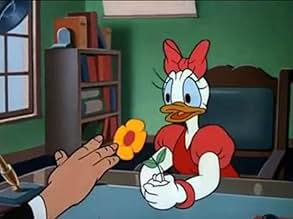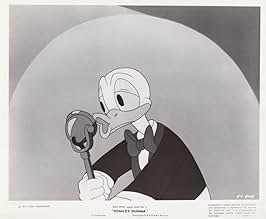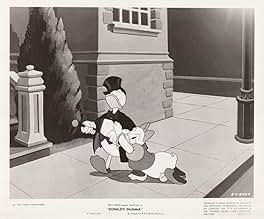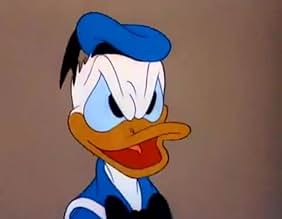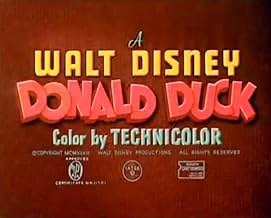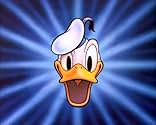PUNTUACIÓN EN IMDb
7,0/10
752
TU PUNTUACIÓN
Donald y Daisy están paseando cuando él es golpeado por una maceta. Está convencido de que es un cantante famoso y canta divinamente, pero no reconoce a Daisy.Donald y Daisy están paseando cuando él es golpeado por una maceta. Está convencido de que es un cantante famoso y canta divinamente, pero no reconoce a Daisy.Donald y Daisy están paseando cuando él es golpeado por una maceta. Está convencido de que es un cantante famoso y canta divinamente, pero no reconoce a Daisy.
Gloria Blondell
- Daisy Duck
- (voz)
- (sin acreditar)
Richard Conte
- Psychiatrist
- (sin acreditar)
Ken Darby
- Donald Duck's Singing Voice
- (sin acreditar)
Clarence Nash
- Donald Duck
- (voz)
- (sin acreditar)
Reseñas destacadas
A Walt Disney DONALD DUCK Cartoon.
DONALD'S DILEMMA is really Daisy's - after a conk on the head leaves her boyfriend a crooning sensation with no remembrance of her whatsoever.
Daisy has one of her very best screen roles in this humorous little film. The fickleness of the public's taste in popular entertainment comes in for a bit of gentle ribbing. Roy Williams, one of the adult members of TV's The Mickey Mouse Club, was the writer on this project. Clarence Nash provides Donald with his ordinary voice.
Walt Disney (1901-1966) was always intrigued by pictures & drawings. As a lad in Marceline, Missouri, he sketched farm animals on scraps of paper; later, as an ambulance driver in France during the First World War, he drew comic figures on the sides of his vehicle. Back in Kansas City, along with artist Ub Iwerks, Walt developed a primitive animation studio that provided animated commercials and tiny cartoons for the local movie theaters. Always the innovator, his ALICE IN CARTOONLAND series broke ground in placing a live figure in a cartoon universe. Business reversals sent Disney & Iwerks to Hollywood in 1923, where Walt's older brother Roy became his lifelong business manager & counselor. When a mildly successful series with Oswald The Lucky Rabbit was snatched away by the distributor, the character of Mickey Mouse sprung into Walt's imagination, ensuring Disney's immortality. The happy arrival of sound technology made Mickey's screen debut, STEAMBOAT WILLIE (1928), a tremendous audience success with its use of synchronized music. The SILLY SYMPHONIES soon appeared, and Walt's growing crew of marvelously talented animators were quickly conquering new territory with full color, illusions of depth and radical advancements in personality development, an arena in which Walt's genius was unbeatable. Mickey's feisty, naughty behavior had captured millions of fans, but he was soon to be joined by other animated companions: temperamental Donald Duck, intellectually-challenged Goofy and energetic Pluto. All this was in preparation for Walt's grandest dream - feature length animated films. Against a storm of naysayers, Walt persevered and over the next decades delighted children of all ages with the adventures of Snow White, Pinocchio, Dumbo, Bambi & Peter Pan. Walt never forgot that his fortunes were all started by a mouse, or that childlike simplicity of message and lots of hard work always pay off.
DONALD'S DILEMMA is really Daisy's - after a conk on the head leaves her boyfriend a crooning sensation with no remembrance of her whatsoever.
Daisy has one of her very best screen roles in this humorous little film. The fickleness of the public's taste in popular entertainment comes in for a bit of gentle ribbing. Roy Williams, one of the adult members of TV's The Mickey Mouse Club, was the writer on this project. Clarence Nash provides Donald with his ordinary voice.
Walt Disney (1901-1966) was always intrigued by pictures & drawings. As a lad in Marceline, Missouri, he sketched farm animals on scraps of paper; later, as an ambulance driver in France during the First World War, he drew comic figures on the sides of his vehicle. Back in Kansas City, along with artist Ub Iwerks, Walt developed a primitive animation studio that provided animated commercials and tiny cartoons for the local movie theaters. Always the innovator, his ALICE IN CARTOONLAND series broke ground in placing a live figure in a cartoon universe. Business reversals sent Disney & Iwerks to Hollywood in 1923, where Walt's older brother Roy became his lifelong business manager & counselor. When a mildly successful series with Oswald The Lucky Rabbit was snatched away by the distributor, the character of Mickey Mouse sprung into Walt's imagination, ensuring Disney's immortality. The happy arrival of sound technology made Mickey's screen debut, STEAMBOAT WILLIE (1928), a tremendous audience success with its use of synchronized music. The SILLY SYMPHONIES soon appeared, and Walt's growing crew of marvelously talented animators were quickly conquering new territory with full color, illusions of depth and radical advancements in personality development, an arena in which Walt's genius was unbeatable. Mickey's feisty, naughty behavior had captured millions of fans, but he was soon to be joined by other animated companions: temperamental Donald Duck, intellectually-challenged Goofy and energetic Pluto. All this was in preparation for Walt's grandest dream - feature length animated films. Against a storm of naysayers, Walt persevered and over the next decades delighted children of all ages with the adventures of Snow White, Pinocchio, Dumbo, Bambi & Peter Pan. Walt never forgot that his fortunes were all started by a mouse, or that childlike simplicity of message and lots of hard work always pay off.
This is a funny cartoon where Daisy goes see a psychiatrist, distressed over Donald getting amnesia from a knock on the head. Donald doesn't recognize Daisy and becomes a famous singer, becomes the world's darling instead of Daisy's.
Daisy I thought has always been bullish to Donald. Now, seeing her getting the brunt of all the bad luck and mishaps in this cartoon, from her getting kicked out by the stagehand to her going crazy over losing Donald, was rather funny and entertaining.
Great fun here with lovable characters and beautiful animation.
Grade A
Daisy I thought has always been bullish to Donald. Now, seeing her getting the brunt of all the bad luck and mishaps in this cartoon, from her getting kicked out by the stagehand to her going crazy over losing Donald, was rather funny and entertaining.
Great fun here with lovable characters and beautiful animation.
Grade A
10Hitchcoc
This is the old bit where someone gets hit on the head and a whole new personality appears. Donald and Daisy are walking down the street when a flower pot falls from a high floor in a skyscraper. He is suddenly transformed into a great actor, singer, and personality. He's on the cover of magazines, he fills entire concert halls, on and on. Meanwhile, Daisy wants him back the way he was. This leads to serious complications and a predictable finish. Watching him get there is a load of fun.
"Donald's Dilemma" is one of the first films to use a very common cliche for TV shows of the 50s and 60s. Early in the cartoon, a flower pot falls off a very high ledge and conks Donald in the head. Instantly, he is an all new duck....one that doesn't recognize Daisy and who is a crooner. In fact, he almost instantly becomes a huge sensation (like Sinatra in his prime) and the world is thrilled with the change. But Daisy is upset...and all she wants back is her cranky old Donald! So, she seeks out professional help...
Like all the Disney films of the era, the animation quality it tops and the cartoon is a wonderful counterpoint to the almost saccharine Mickey Mouse cartoons of the 1940s (where he is so nice...too nice if you ask me). Instead, this Daisy/Donald cartoon is violent and mean-spirited...exactly what most folks want out of a cartoon! Very enjoyable and nice to see a cartoon from Daisy's point of view.
Like all the Disney films of the era, the animation quality it tops and the cartoon is a wonderful counterpoint to the almost saccharine Mickey Mouse cartoons of the 1940s (where he is so nice...too nice if you ask me). Instead, this Daisy/Donald cartoon is violent and mean-spirited...exactly what most folks want out of a cartoon! Very enjoyable and nice to see a cartoon from Daisy's point of view.
The song Donald sings is "When You Wish Upon A Star"however it is slightly different from the famous song we know today because donald Replaces the verse "Makes No Difference who you are" to "Shine in Right In From Afar. I saw this short many times on a home video. I have read other comments about this short and they said that the title should be "Daisy's Dilemma" and i agree with that. I don't think i saw donald loose his temper in this short.
¿Sabías que...?
- CuriosidadesThis was the first cartoon to feature the newer Donald Duck theme song ("No One But Donald Duck") during the opening credits.
- PifiasThe number of fingers on the psychiatrist's hand frequently changes from 4 to 5.
- Versiones alternativasA scene in which Daisy considers suicide is often censored in later showings.
- ConexionesEdited into Disneylandia: Inside Donald Duck (1961)
Selecciones populares
Inicia sesión para calificar y añadir a tu lista para recibir recomendaciones personalizadas
Detalles
- Duración7 minutos
- Relación de aspecto
- 1.37 : 1
Contribuir a esta página
Sugerir un cambio o añadir el contenido que falta

Principal laguna de datos
What is the English language plot outline for El dilema de Donald (1947)?
Responde
